What Is the 1987 Silver Dollar Made Of?
The 1987 silver dollar is made of 99.93% Silver and .007% Copper. The mass of this silver dollar is 31.103 grams or 1.00 troy ounce. The diameter is 40.6 mm and its thickness is 2.98 mm.
As the official silver bullion coin of the United States, it is a special collector’s item and most people would like to have one of these.
First minted in 1986 and released on November 24 of the same year, the 1987 silver dollar, also known as the American Silver Eagle, was designed by John Mercanti (reverse) and Adolph A. Weinman (obverse).

As per its design, on the obverse, you’ll find the “Walking Liberty,” which was based on the design used in the half-dollar produced from 1916 to 1947.
For most people, the half-dollar design in those years was considered to be the most beautiful American coin in history.
The Walking Liberty holds with her branches of olive that represent peace. Behind her is a flag of stars. On the lower left side, you’ll find a sun.
Inscriptions include the following:
- IN GOD WE TRUST
- LIBERTY
- 1987
On the reverse side, the proud heraldic eagle spreads its wings. On its beak, it holds a banner that says, “E PLURIBUS UNUM,” which means “Out of many, one.”
On top of its head, you’ll find the 13 stars, which represent the 13 colonies. The eagle’s left talon holds an olive branch and on the right talon, you’ll find arrows.
Inscriptions on the reverse include the following:
- UNITED STATES OF AMERICA
- 10 OZ FINE SILVER-ONE DOLLAR
- Mint mark (P, S, or W)
- Designer’s initial (JM)
The nominal value of the 1987 silver dollar coin is one dollar. The coin is struck in the one-troy ounce and the United States Government guarantees its weight and purity. The minting of the silver dollar was authorized by the Liberty Coin Act, which was ratified on July 9, 1985.
Because the silver dollar is a special coin, it is minted in the Philadelphia Mint, West Point Mint, and San Francisco Mint. This coin can even be used to fund IRA or Individual Retirement Account investments.
Today, there’s a newly designed reverse, which was prepared by Emily Damstra. In this design, the eagle no longer floats, but it is seen to be landing on a branch.
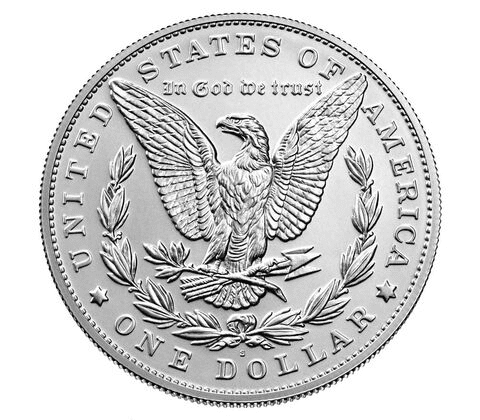
1987 Silver Dollar Varieties
The 1987 silver dollar comes in different varieties. Here are some of them:
1987 Silver Eagle Dollar (Regular Strike)
Year of minting: 1987
Mint Mark: No Mint
Place of minting: Philadelphia
Quantity produced: 11,442,335
Face Value: $1
Price: $2-$780
Total weight: 31.103 grams
Diameter: 40.6 mm
Edge: Reeded
Composition: 99.9% silver
Designer: Adolph Weinmann (Obverse) and John Mercanti (reverse)
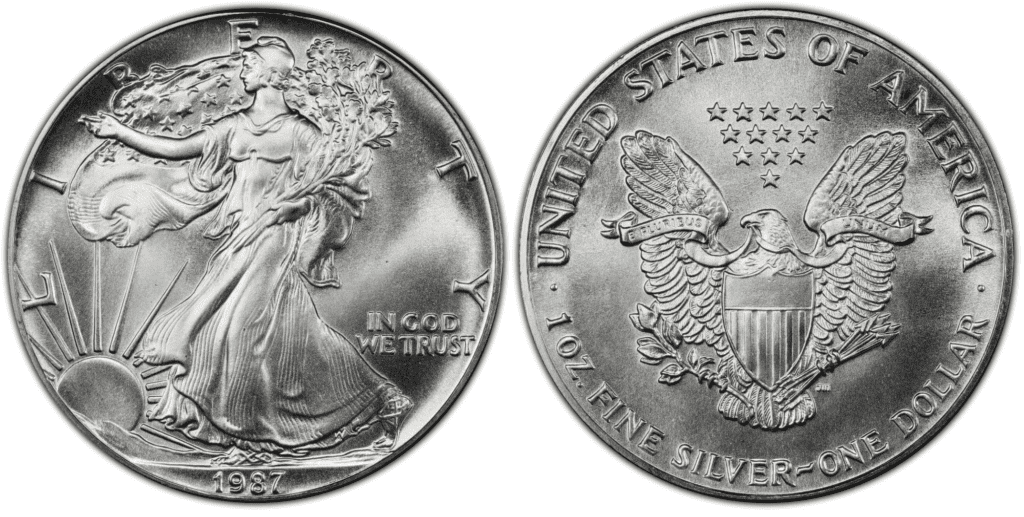
The 1987 silver eagle dollar was produced in the Philadelphia Mint. There were more than 11 million of these coins minted in 1987. The usual price of this coin can range from $33 to $780.
1987 Silver Proof Eagle Dollar
Year of minting: 1987
Mint Mark: S
Place of minting: San Francisco
Quantity produced: 904,732
Face Value: $1
Price: $2-$504
Total weight: 31.103 grams
Diameter: 40.6 mm
Edge: Reeded
Composition: 99.9% silver
Designer: Adolph Weinmann (Obverse) and John Mercanti (reverse)
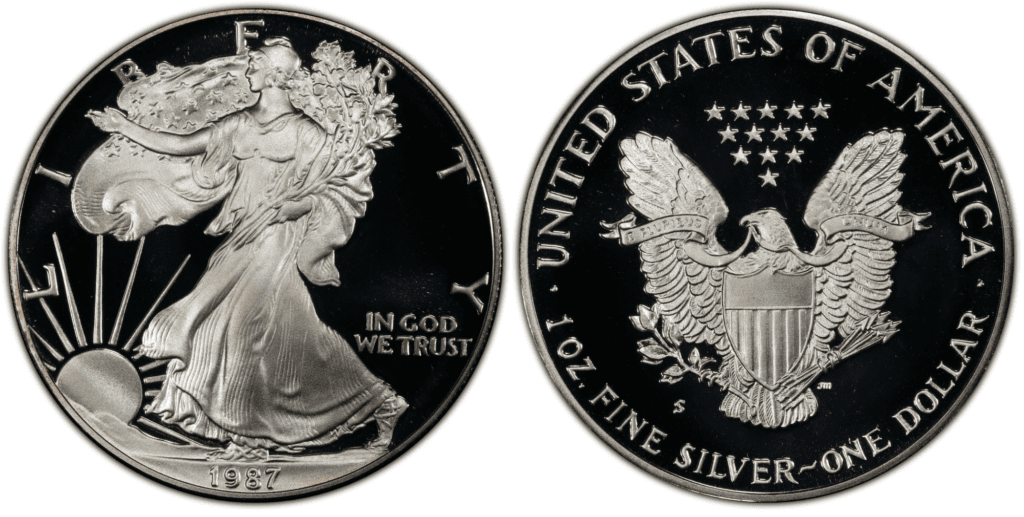
The 1987 silver proof eagle dollar is a proof coin produced in the San Francisco Mint. Since it’s a proof coin, it has a higher level of luster and eye appeal. Its engraved elements are more detailed and the background of the coin looks shinier.
At the end of 1987, there were more than 904 thousand silver-proof eagle dollar coins produced.
1987 Bullion American Silver Eagle
Year of minting: 1987
Mint Mark: No mint mark
Place of minting: San Francisco
Quantity produced: 12,347,067
Face Value: $1
Price: $2-$780
Total weight: 31.103 grams
Diameter: 40.6 mm
Edge: Reeded
Composition: 99.9% silver
Designer: Adolph Weinmann (Obverse) and John Mercanti (reverse)

The 1987 Bullion American Silver Eagle has the highest mintage level among the silver eagle varieties. At the end of 1987, there were more than 12 million of the bullion American silver eagle produced. The production of the silver eagle has shot up because of how popular it was when released in 1986.
List of Silver Dollar Errors
The 1987 silver dollar was carefully produced. However, errors are inevitable and thus, there are those coins that incurred an error during the minting process.
Coin minting errors can happen due to a problem in the die, planchet, or strike. Errors may also happen before, during, and after the minting process.
Some of the most common coin-minting errors that you might see include double strikes, broad strikes, off-center strikes, die cracks, planchet folds, and others.
Here are some examples of silver dollar errors:
1987 S Proof Silver Eagle Obverse Struck Thru Error
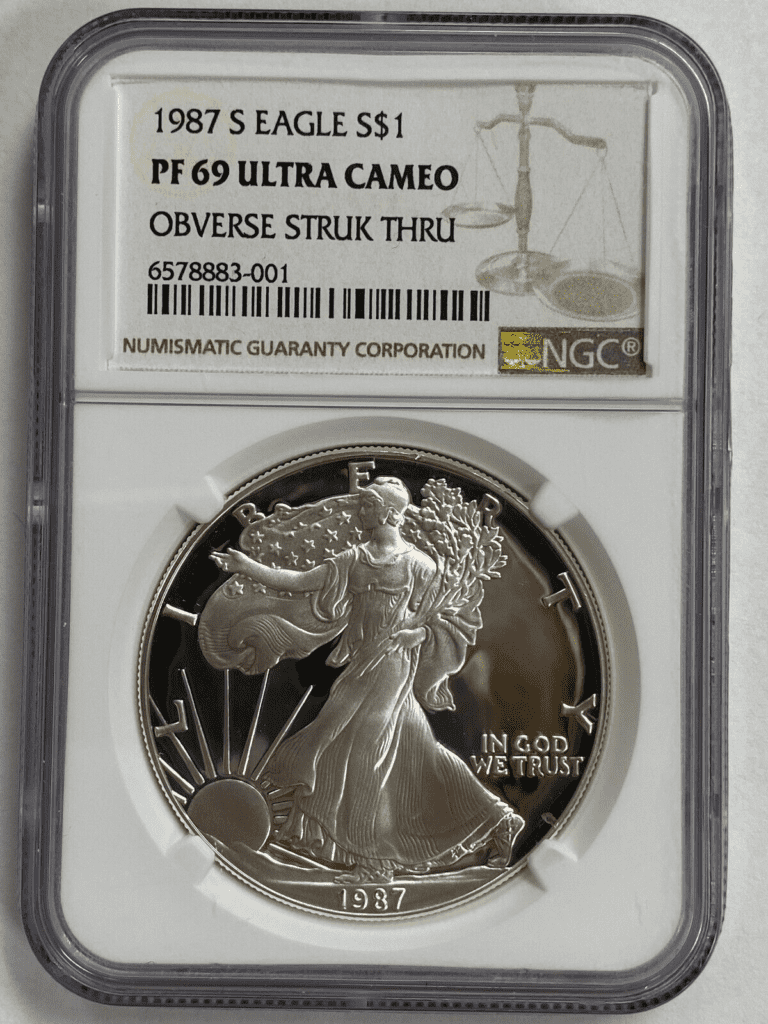
This coin has an error with how the die was struck. During the strike, a foreign material got between the blank planchet and the die. This object might have been metal shavings, staples, or other objects.
1987 American Silver Eagle Error Minor Struck Thru OBV
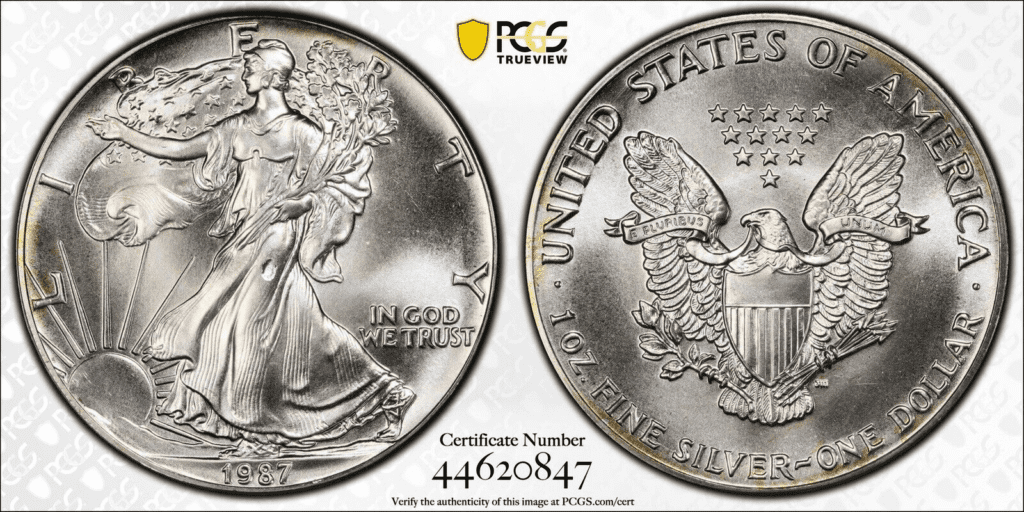
Look closely at the thigh of the walking Lady Liberty. It seems that something was chipped or missing. This is most likely caused by a failed strike.
How Much Is the 1987 Silver Dollar Worth Today?
The 1987 silver dollar has a nominal face value of one dollar. The usual selling price of this coin is around $2 and above. Since this is a special type of coin, you may be able to sell it above its face value. When it comes to the melt value, the price of silver increases and decreases. Thus, melt value changes regularly.
To give you an idea of how much a 1987 silver dollar is worth, here is a comparison table:
| Coin | Condition | Grade | Mintage | Value |
| 1987 Silver Eagle Dollar (Regular Strike) | Circulated/mint | Not graded | 11,442,335 | $1.00-$2.00 |
| 1987 Silver Proof Eagle Dollar | Circulated/proof | Not graded | 904,732 | $1.00-$2.00 |
| 1987 Bullion American Silver Eagle | Circulated/mint | Not graded | 12,347,067 | $1.00-$2.00 |
| 1987 Silver Eagle Dollar (Regular Strike) | Uncirculated/mint | MS-68 | 11,442,335 | $23-$180 |
| 1987 Silver Eagle Dollar (Regular Strike) | Uncirculated/mint | MS-69 | 11,442,335 | $34-$280 |
| 1987 Silver Eagle Dollar (Regular Strike) | Uncirculated/mint | MS-70 | 11,442,335 | $540-$960 |
| 1987 Silver Proof Eagle Dollar | Uncirculated/Proof | MS-68 | 904,732 | $25-$114 |
| 1987 Silver Proof Eagle Dollar | Uncirculated/Proof | MS-69 | 904,732 | $52-$192 |
| 1987 Silver Proof Eagle Dollar | Uncirculated/Proof | MS-70 | 904,732 | $240-504 |
How Does The Grading System Work?
The Sheldon Scale is used by numismatists to provide a numerical value to coins. The Sheldon Scale goes from poor (P-1) to perfect mint state (P-1) (MS-70). Coins were originally evaluated using words to reflect their condition (Good, Fair, Excellent, Etc.). Unfortunately, coin collectors and dealers had different ideas about what each of these terms represent.
Professional numismatists joined together in the 1970s and established CoinGrading standards. These numismatists now assign grades at key places on the seventy-point scale, using the most regularly utilized numeric points in conjunction with the original adjective grade. The following are the most common coin grades:
-
-
- (P-1) Poor – Indistinguishable and probably damaged; if used, must have a date and mintmark; otherwise, rather battered.
- (FR-2) Fair – Nearly smooth, but without the damage that a coin graded Poor often possesses. The coin must have enough detail to be identified.
- (G-4) Fair – Inscriptions have merged into the rims in some areas, and important elements have been mostly erased.
- (VG-8) Very Good- A little weathered, but all of the primary design elements are visible, albeit faintly. There is little if any, central detail left.
- (F-12) Good – The item is very worn, yet the wear is even, and the overall design details stand out clearly. Rims are almost completely isolated from the field.
- (VF-20) Very Fine – Moderately weathered, with some finer features still visible. The motto or all letters of LIBERTY are readable. Both sides of the coin have entire rims that are separated from the field.
- (EF-40) Extremely Fine – Gently used; all gadgets are visible, and the most important ones are bold. The finer details are bold and clear, however, light wear may be seen.
- (AU-50) Uncirculated – Slight evidence of wear on the coin’s design’s high points; may have contact marks; eye appeal should be adequate.
- (AU-58) Uncirculated Choice – Slight traces of wear, no severe contact marks, almost full mint shine, and great eye appeal.
- (MS-60) Mint State Basal – Strictly uncirculated; no indication of wear on the coin’s highest points, but an unsightly coin with reduced luster, visible contact marks, hairlines, and other flaws.
- (MS-63) Mint State Acceptable – Uncirculated, but with contact scratches and nicks, little reduced shine, but otherwise appealing appearance. The strike is weak to average.
- (MS-65) Mint State Choice – Uncirculated with great mint shine, very little contact blemishes, and exceptional eye appeal. The strike is unusually severe.
- (MS-68) Mint State Premium Quality – Uncirculated with superb luster, no obvious contact marks to the naked eye, and exceptional eye appeal. The strike is quick and appealing.
- (MS-69) Almost Perfect Mint State – Uncirculated with perfect brilliance, a sharp and appealing strike, and extremely good eye appeal. A near-perfect coin with minor imperfections in the planchet, strike, and contact markings (seen only under 8x magnification).
- (MS-70) Mint State Perfect – Under 8x magnification, there are no tiny imperfections discernible; the strike is crisp, and the coin is perfectly centered on a beautiful planchet. Rarely seen on a coin, this coin is bright and whole, with original luster and exceptional eye appeal.
-
Where to Buy or Sell 1987 Silver Dollar?
If you’re planning to sell your 1987 silver dollar or you’re looking to buy one, then the best place to go would be the Internet.
You simply need to do a Google search and you should find a list of websites where you can buy or sell 1987 silver dollar coins. Here are some of the best online platforms you might want to check:
- Facebook marketplace
- eBay
- Amazon
- Etsy
- JM Bullion
- SD Bullion
- Coin Appraiser
- Golden Eagle Coins
- Apmex
Aside from online, you can visit offices of coin appraisers. Usually, those that offer coin grading services sell or buy silver coins, too. If not, they can refer you to the right dealer.
Check out coin and antique shops. Auction houses may also offer buy-and-sell coin services. If possible, try to join clubs or groups of collectors. Having an extensive network of like-minded people can help you buy and sell silver coins.
FAQs
How many silver eagles were minted in 1987?
There were a total of 24,694,134 silver eagle coins minted in 1987. Here’s the breakdown:
- 1987 Silver Eagle Dollar (Regular Strike) – 11,442,335
- 1987 Silver Proof Eagle Dollar – 904,732
- 1987 Bullion American Silver Eagle – 12,347,067
Where is the mint mark on the 1987 silver dollar?
The mint mark is found on the reverse side of the 1987 silver dollar, just at the lower left side of the eagle, near the left talon.
How much is a 1897 silver dollar worth today?
The 1897 silver dollar is worth between $29 to $52. However, if you still have a beautiful, flawless, and uncirculated 1897 silver coin, you might be able to sell that for as much as $1,600 in the open market.
